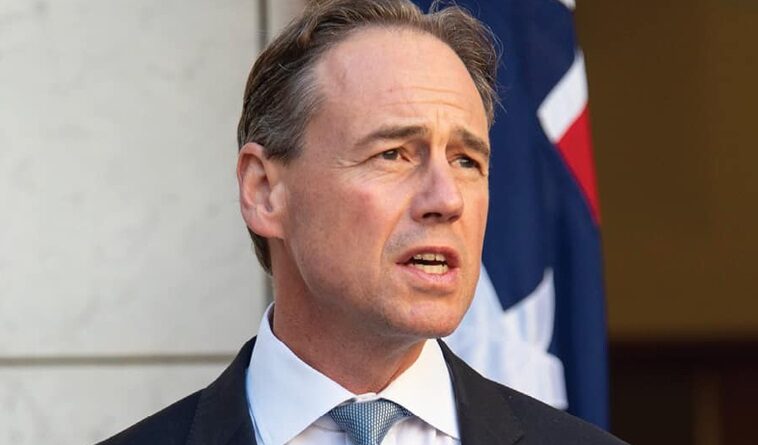Health Minister Greg Hunt goes to hospital with infection but says don’t blame the jab

Health Minister Greg Hunt was admitted to hospital on Tuesday with “a suspected infection”.
In a statement on Tuesday evening his office said “he is being kept overnight for observation and is being administered antibiotics and fluid.” It said Hunt “is expected to make a full recovery.”
The condition of Hunt – who together with former prime minister Julia Gillard received the AstraZeneca vaccine at the weekend – “is not considered to be related to the vaccine,” the statement said.
But his hospitalisation is unhelpful when political figures are seeking to promote confidence by getting their shots early.
The announcement about Hunt came hours after Victorian Premier Danial Andrews was admitted to intensive care following a fall on slippery stairs, which resulted in several broken ribs and vertebrae damage.
It is not known when Hunt will be back at work.
Meanwhile pressure continued on Scott Morrison over Attorney-General Christian Porter, who is on mental health leave after being accused of historical rape, which he strongly denies.
Morrison told reporters he had spoken to Porter but he had not said when he would be returning to work.
The Prime Minister confirmed Porter won’t be there when parliament meets next week. “But he’ll give me further updates as we go through the course of this week,” he said.
As Morrison tries to switch attention to the economy, with announcements this week of post-JobKeeper measures, he continues to be dogged by the issues around Porter and Defence Minister Linda Reynolds.
Parliament on Monday heads into its final fortnight before the budget session, with the House of Representatives meeting for two weeks and the Senate for one week followed by Senate estimates hearings.
Reynolds, on medical leave, will miss both weeks. If Porter also misses the whole fortnight, the first time the two ministers would be subjected to parliamentary questioning would be budget week in May. Their return could be a distraction for the government, which would want all attention on the budget.
Morrison, who has spoken to Reynolds’ doctor, said on Tuesday her health issues – she has an underlying heart condition – were “quite serious”.
Reynolds became unwell when she was under fire over her former staffer Brittany Higgins’ allegation she was raped in 2019 by a colleague in Reynolds’ office and was not given enough support.
Morrison, who criticised Reynolds for not telling him of the incident, has not yet released the results of an inquiry by his departmental secretary, Phil Gaetjens, into who in his own office knew of the matter.
The Prime Minister was questioned again on Tuesday about his failure to read the dossier containing the allegations against Porter. He said the formal documents had been provided to his office on a Friday afternoon, when he was in Sydney.
“And so those documents were immediately provided to the Federal Police. So I was not in the same place as those documents.”
Morrison continues to resist calls for an independent inquiry into the allegation against Porter, and said he had not spoken to the Solicitor-General about the allegation “because there is not a separate legal process that applies to the Attorney-General or anyone else”.
On the economic front, in an address to the Australian Financial Review’s business summit, Morrison said Australia was “leading the world out of the global pandemic and the global recession it caused”.
But he expressed frustration that, despite unemployment still being high, many jobs can’t be filled, in the absence of workers coming from abroad.
“Despite targeted measures to incentivise Australian JobSeeker recipients to relocate to where the jobs are – $6,000 to move there and take those jobs – unemployed Australians are simply and regrettably not filling these jobs,” he said.
“Right now there are 54,000 jobs going in regional Australia.
“And every day we hear the stories of employers, especially in regional areas, unable to fill positions.”
In response, the government was strengthening the mutual obligation requirements for those getting JobSeeker.
“We must also re-look at the role the temporary visa holders play in meeting our economy’s workforce requirements, where Australians do not fill these jobs.
“Of course we want Australians to fill these jobs.
But “we need to see that, rather than taking Australians’ jobs, we need to instead appreciate how filling critical workforce shortages with temporary visa holders can actually create jobs elsewhere in the economy and, in particular, sustain growth and services in our regional economies”. That way, Australians got a net benefit, Morrison said.
“This issue will not go away when the pandemic ends. It’s a thorny issue for us to deal with and we must.”

